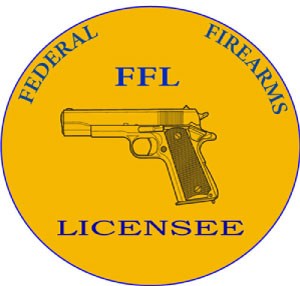What is a Federal Firearms License?
A Federal Firearms License (FFL) is issued by the federal government to persons, corporations, partnerships, or any other lawfully established business engaging in certain activities requiring the license; dealing or manufacturing firearms for example.

In general, persons who engage in the importing, manufacturing, or dealing in firearms, or importing or manufacturing ammunition, require a Federal Firearms License (FFL).
The license is intended for persons who “engage in the business” as defined by the federal law. The license is not intended for persons who would like to enhance a personal collection or ship firearms interstate.
Although there is some gray area as to what “engaged in the business” means, persons or companies receiving money, or some other compensation as the result of the sale or brokering of firearms should determine if they should be licensed prior to proceeding with such activity.
The following definition may be helpful.
A Dealer in firearms is defined as follows: 27 CFR 478.11
A person who devotes time, attention, and labor to dealing in firearms as a regular course of trade or business with the principal objective of livelihood and profit through the repetitive purchase and resale of firearms, but such a term shall not include a person who makes occasional sales, exchanges, or purchases of firearms for the enhancement of a personal collection or for a hobby, or who sells all a part of his personal collection of firearms.
Are There Different Types Of Federal Firearms Licenses?
There are several types of Federal Firearms Licenses (FFL). Each activity requiring a federal firearms license has been assigned a different type.
Type 01/02: Dealer in Firearms Other Than Destructive Devices., Including Pawn Broker. This type also includes gunsmith activities.
Type 06: Manufacturer of Ammunition for Firearms Other Than Ammunition for Destructive Devices or Armor Piercing Ammunition.
Type 07: Manufacturer of Firearms Other Than Destructive Devices.
Type 08: Importer of Firearms Other Than Destructive Devices or Ammunition for Firearms Other Than Destructive Devices, or Ammunition Other Than Armor Piercing Ammunition.
Type 09: Dealer in Destructive Devices
Type 10: Manufacturer of Destructive Devices, Ammunition for Destructive Devices or Armor Piercing Ammunition.
Type 11: Importer of Destructive Devices, Ammunition for Destructive Devices or Armor Piercing Ammunition.
In general, most persons applying for a Federal Firearms License (FFL) will apply for the Type 01/02 license. All license types have generally the same qualifications criteria, but local and state law applying to the type of business conducted will have a significant effect on the approval process at the federal level.
What Are The Basic Requirements For Getting A Federal Firearms License?
In accordance with federal regulations promulgated under the Gun Control Act of 1968, any person who proposes to engage in the business as a firearms dealer, importer, or manufacture, must file the ATF Form 7 (Application for a Federal Firearms License).
The person must submit fingerprints, photos, and execute the form under the penalties of perjury imposed under 18 U.S.C. 924.
In accordance with 27 CFR 478.47, the Chief, Federal Firearms Licensing Center, shall approve a properly executed application for license on the ATF Form 7 if the applicant meets the following criteria:
27 CFR 478.47 paraphrased:
1) The applicant is 21 years of age or over
2) The applicant is not prohibited from possessing firearms under provisions of the Gun Control Act
3) The applicant has not willfully violated the Gun Control Act
4) The applicant has not willfully failed to disclose material information required, or made a false statement in connection with the application
5) The applicant has a premises from which to conduct business, or from which he intends to conduct business within a reasonable amount of time
These are the basic qualifications. However, there are a number of important elements outside of these particular qualifications that must also be addressed during the application process.
The 5th qualification above is historically the most difficult element of the qualification process. This is because having a qualified “premises” from which to conduct business encompasses a number of criteria related to state and local law that at times can be difficult to overcome. This is generally related to FFL zoning requirements.
